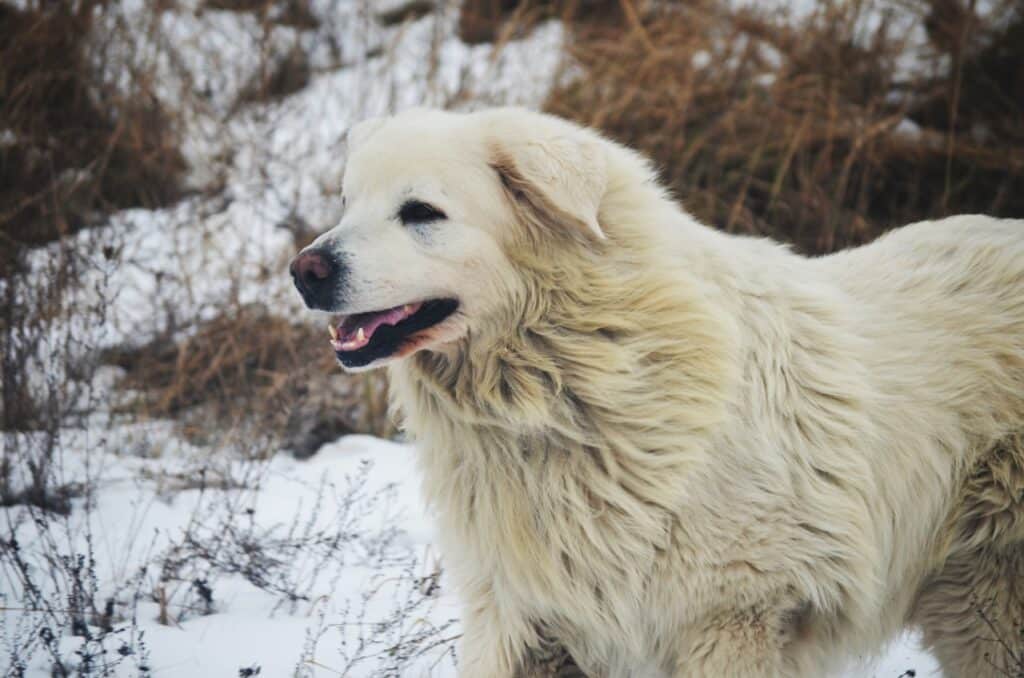Understanding the Reasons Behind Dog Diarrhea: Diarrhea in dogs leads to loose or liquid stools. When dealing with a dog experiencing diarrhea, it’s crucial to identify the root cause of this discomfort.
Potential triggers include dietary changes, food intolerance, poisoning, internal parasites, kidney or liver issues, anxiety, stress, and, in severe cases, cancer. It’s important to note that diarrhea in dogs is a symptom rather than a standalone disease. Once the underlying cause is determined, appropriate treatment can be administered.
Differentiating between diarrhea caused by a disease and that stemming from a gastrointestinal problem can be achieved through some basic first aid measures. In this article, we will elaborate on what steps to take if your dog has diarrhea and when it’s necessary to seek veterinary assistance.
Table of Contents

Diarrhea in Dogs – What is it
Identifying Dog Diarrhea Signs: The most noticeable indication of diarrhea in dogs is the presence of very loose stools. You might observe an increased frequency of bathroom trips, even indoors, as your dog struggles to hold it in.
Predictably, softer or more liquid stools often come with additional symptoms like vomiting, flatulence, and a potential rise in body temperature. In cases of mild diarrhea, your dog’s behavior and mood may remain unchanged. However, if the condition is severe, you may notice signs of depression along with other concerning symptoms, such as blood in the stool, loss of appetite, and weight loss.
Dogs experience diarrhea when diseases or disorders affect their gastrointestinal tract. This disruption leads to a disturbance in the intricate biochemical processes responsible for water absorption and intestinal peristalsis (contractions facilitating the movement of food through the intestine). The causes of this disruption can be internal, like kidney disease, or external, such as parasite infestation, potentially resulting in constipation or diarrhea in the dog.

Types of diarrhea in dogs
Before guiding on dealing with your dog’s diarrhea, it’s crucial to differentiate between the various types of diarrhea and identify the specific one affecting your dog. Diarrhea can be categorized based on its duration as chronic or acute, or according to its cause. In the latter scenario, it is further subdivided into:
Osmotic diarrhea
Osmotic diarrhea results from poor food absorption due to factors like viral infections, intolerance to specific foods (such as gluten), and the presence of benign or malignant tumors or chronic inflammatory diseases in the digestive system.
Additionally, a shift in the dog’s diet, consuming expired or spoiled food, a digestive block, pancreatic insufficiency, or biliary insufficiency can contribute to osmotic diarrhea. Furthermore, quick or excessive eating can also be a cause of this type of diarrhea in dogs.
Secretory diarrhea
This particular type of diarrhea in dogs arises when the animal’s body generates more water, gastric juices, and minerals than it can effectively absorb. It can be triggered by factors such as bacterial infections, pancreatic insufficiency, the consumption of laxative medications or foods, or diseases impacting the intestinal mucosa. In these instances, dogs may experience bloodless and highly liquid diarrhea.
Impaired absorption diarrhea
This form of diarrhea in dogs emerges when viral or bacterial infections lead to damage in the mucous membrane of the small intestine. In such cases, affected dogs exhibit what is known as “bloody diarrhea” — stools containing blood, pus, or a layer of mucus.
Motor diarrhea
It occurs due to either excessive intestinal movement, where the digestive system operates too rapidly, absorbing less water, or poor intestinal mobility, where reduced movement irritates the mucous membrane.
This kind of diarrhea in dogs typically stems from conditions such as stress or anxiety, thyroid hormone imbalances, or as a consequence of a stomach operation.
Mixed diarrhea
Dog diarrhea can result from various factors, leading to secretory diarrhea due to osmosis or a combination of the four different types. Therefore, even at the slightest symptom, we strongly advise reaching out to your veterinarian.

Dogs in Diarrhea – Main Causes
As previously mentioned, canine diarrhea stems from various gastrointestinal issues triggered by several factors. The primary causes of diarrhea in dogs include:
- Climatic factors: Cold strokes and heat strokes.
- Ingestion of improper food: Consuming garbage, objects, spoiled food, or dead animals.
- Changes in the usual diet: Sudden alterations like excessive chocolate, sugar, or cold cuts.
- Food intolerance: Allergies and allergic reactions.
- Toxic substances: Ingestion of poisonous plants or chemicals, including medicines.
- Emotional causes: Especially in puppies, factors like anxiety, stress, or nervousness.
- Viral and bacterial infections.
- Parasitic infestations.
- Internal diseases: Such as kidney, liver issues, cancer, or internal cancers.
Contrary to the common belief that dogs have resilient stomachs, they can be sensitive. A minor change in diet or contact with a cold floor can disturb their intestinal tract. Hence, it’s crucial to introduce dietary changes gradually. Emphasizing a healthy and proper diet is essential for the overall well-being of your furry companion.
Addressing Dog Diarrhea – When to Seek Assistance?
When faced with a dog experiencing diarrhea, the initial step is to assess the consistency and color of their stool. If there’s evidence of blood, pus, mucus, or worms, an immediate trip to the vet is crucial. The bleeding might be a result of exertion, but it could also indicate a serious underlying illness. In such cases, it’s advisable to collect a stool sample and consult a specialist. For puppies, diarrhea could be linked to conditions like parvovirus or distemper.
If there is no mucus, pus, or worms, but blood is present in the stool, investigating the causes of diarrhea becomes imperative. Begin treatment and present all available information to the vet. Consider recent diet changes, instances of scavenging from the garbage, and the potential for intoxication or poisoning by plants or medicines. In cases of poisoning, refer to our AnimalPedia article on “Poisoning Symptoms.”
In the absence of blood in the stool, the next step in addressing the question “what to do if your dog has diarrhea” involves fasting for 24 hours for adult dogs and 12 hours for puppies. During fasting, refrain from offering any food but ensure access to fresh and clean water. Vigilantly observe the dog during this period, ensuring adequate hydration. If the dog refuses water, exhibits apathy, or vomits, prompt veterinary attention is necessary.
Important caution: Avoid giving dairy products during diarrhea, as many dogs are lactose intolerant. Additionally, refrain from medicating the dog before consulting the vet, as improper administration of medications can worsen the clinical condition.

Diarrhea in Puppy Dogs
Occurrences of diarrhea are more prevalent in puppies compared to adult dogs. This is due to their weaker immune systems and heightened sensitivity to changes and infections. In some instances, diarrhea in puppies can arise as a side effect of vaccination or exposure to pesticides, with recovery typically occurring within 24 hours.
If the diarrhea persists, it may indicate a more serious issue, such as intestinal parasites like tapeworms or food intolerances. In such cases, puppies often exhibit additional symptoms like vomiting, lethargy, weight loss, fever, blood in the stool, or the presence of worms. It is strongly recommended to promptly consult a vet, especially if the 12-hour fasting period has passed and the stools remain liquid or show signs of bleeding. Acting calmly and seeking veterinary attention can make a significant difference in your puppy’s well-being.
In some cases, diarrhea in puppies may be a response to stress or emotional disturbances. Identifying and addressing these underlying causes is essential.
Diarrhea in these situations could be the puppy’s way of signaling distress or drawing attention to issues in its environment, such as changes in habits, the introduction of a new family member, or sudden shifts in the owner’s mood.
Dogs, especially puppies, are highly sensitive to their surroundings, so dedicating time to their needs and responding to their psychophysical well-being is crucial.
How to stop diarrhea in dogs
To address diarrhea in dogs, simply follow the steps outlined in this paragraph. The comprehensive solution to the question “What to do if the dog has diarrhea?” involves implementing the following guidelines:
- Light Diet: When wondering what a dog with diarrhea can eat, opt for easily digestible foods. Ideal choices include canned meat for dogs or a homemade mix of white rice and boiled chicken (cut into small, salt-free pieces). Consulting your veterinarian for personalized advice is recommended.
- Portion Control: Divide meals into smaller, more frequent portions. Starting with smaller doses aids digestion. Maintain the dog’s regular food amount but distribute it across several servings.
Why Dogs Have Diarrhea
Gradual Diet Reintroduction: Introduce the regular foods back into the dog’s diet gradually, such as kibble, ensuring there are observable improvements in the dog’s health. Avoid combining homemade food with his regular diet. You can diversify the diet by offering a slightly increased amount of treats each day until it compensates for daily meals.
Lighter and Smaller Stools: Don’t be alarmed if you initially observe changes in the color and quantity of your dog’s stool. This adjustment is likely due to the lighter diet he is following.
Probiotic Use: Incorporate specific probiotics for dogs or ones of high quality to aid digestion and promote healing. Refer to our article on “Probiotics for dogs” for more detailed information.
Prompt Vet Consultation: If your dog’s diarrhea doesn’t improve after 24 hours, seek immediate veterinary attention. A precise and timely diagnosis is crucial in these cases to prevent more severe problems. If possible, bring along a sample of your dog’s stool for examination.
What to do if your dog has diarrhea – Home remedies
In the previous paragraphs we have already mentioned some measures that we can use at home to treat diarrhea in dogs. Nonetheless, below we go into detail:
Probiotics for dogs with diarrhea
Restoring Intestinal Health with Probiotics: Probiotics play a crucial role in repairing damaged intestinal flora and addressing irregular intestinal transit. Nowadays, natural probiotics for dogs are readily available in the market, but it’s essential to know that these beneficial bacteria strains also exist naturally in certain foods. A particularly suitable option for managing diarrhea in dogs is natural, sugar-free yogurt.
Addressing Dehydration with Water and Sugar: This remedy proves effective when immediate veterinary assistance is not possible, combating dehydration induced by diarrhea and vomiting. Providing isotonic drinks to animals is another viable option. However, seeking specialized veterinary care to administer a serum is imperative at the earliest opportunity.
Reintroducing Easy-to-Digest Foods: Following a period of fasting, gradually reintroduce foods that aid the dog’s recovery. Opt for an astringent diet featuring easily digestible items that help solidify the stool. Some recommended options include:
Utilizing Rice Water for Digestive Benefits: Rice water, renowned for its digestive and astringent properties, serves as an excellent remedy for regulating intestinal transit and combatting diarrhea in dogs. The inclusion of this cereal in the diet contributes to stool hardening.
Important Note: This article serves as informative content only. At ExpertAnimal, we lack the authority to prescribe veterinary treatments or offer diagnoses. We strongly encourage pet owners to consult a veterinarian if their animals experience any form of discomfort or distress.